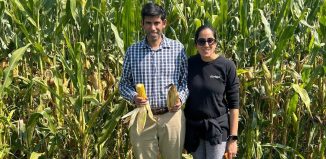BNL’s Bachner focuses on nuclear safety
Katherine Bachner speaks Russian, regularly spends a week in Kazakhstan and understands Russian culture. That is why she recently decided it was time someone worked on a project that would help her colleagues connect with their Russian counterparts without committing any cultural faux pas.
Back when she was starting to work with a Russian program, she went on a trip with an American team who attended an enormous banquet arranged by their hosts. The head of the American group didn’t give a toast.
“If you’re the leader of a delegation, it’s incredibly rude” not to give a toast, even if it’s through an interpreter, she said. “That’s Russia 101 and they weren’t doing it. I thought that was very strange.”
At Brookhaven National Laboratory, where she has worked since 2011, Bachner is a part of the Nonproliferation and National Security Department. That means she works with people in numerous countries to provide safeguards for their nuclear power plants and to help detect undeclared nuclear activities and procurement networks.
In Kazakhstan, for example, she’s been helping a nuclear facility upgrade its measurement procedures to improve the accuracy of data that the International Atomic Energy Agency collects when they conduct inspections. The BNL team works with executives at the plant, with the IAEA and with a national company in Kazakhstan.
It’s a multilateral effort to “assist a partner country to improve their safeguards,” she explained.
A cornerstone of her work is “helping the U.S. government develop policies that will make the Nonproliferation Treaty more effective and viable in the long term,” she said. Much of her work is with the IAEA, which “helps implement nuclear safeguards and creates a better regime of safeguards in [other] countries.”
A self-described idealist, Bachner got into the world of nuclear safeguards because she said she hopes some day that the world can be free of nuclear weapons. “I have a passion for trying to make the world a better place,” she said. “I think the field is doing that slowly and sometimes invisibly. We need more young people working on it. It needs to be demystified.”
Indeed, other experts in the nonproliferation world believe Bachner is among a key group of professionals who will ensure a world of nuclear accountability and safety. Bachner “is part of the next generation of nonproliferation experts,” said Susan Burk, a former special representative of the president for nuclear nonproliferation and currently a consultant who has worked with Bachner at BNL. Bachner can be “an important role model for other young people who can look at her and her accomplishments and appreciate how gratifying working on these issues can be.” Burk said she is confident Bachner is an “excellent U.S. representative who is sensitive to the unique cultures of those countries.”
Bachner, who has a master’s degree in cultural anthropology from Columbia as well as a master’s degree in international policy studies from Monterey Institute of International Studies, said the results of her work on enhancing an understanding for scientists and regulators of cultural differences is unlikely to be a simple checklist for each country.
“If you’re working in Russia, the first thing the person would need to do is take a class or course in basic concepts that there are these international differences,” she said. “You need to try to learn some specific things about the culture you’ll be a part of.”
She is hoping to produce a paper that will explain the need for intercultural empathy and training, even for people with expertise in traveling and foreign languages. “If you improve your relationships with your counterparts, you improve the likelihood that the project will be effective,” she said.
Bachner, who grew up in Washington, D.C., and upstate New York, said she loves being near the water. She and her husband Eric live in East Moriches, where she swims, kayaks and bikes. She’s working on a “hilarious, fantastical book” that is in its first draft. An animal lover, Bachner has experience on two continents milking goats. She worked in Hawaii and in Mongolia, where she was performing anthropological field work.
“Central Asian goat milking is really different,” she said. “Our goats give more milk and are better fed. They don’t have to range as far. It’s kind of shocking when I came back from Mongolia to notice how plentiful our lives are.”
As for her work on nuclear safety, Bachner said she is working toward disarmament in part because “there is little that could threaten so much of the world at once.”






